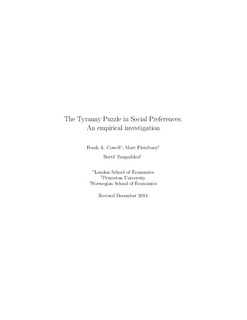| dc.contributor.author | Cowell, Frank A. | |
| dc.contributor.author | Fleurbaey, Marc | |
| dc.contributor.author | Tungodden, Bertil | |
| dc.date.accessioned | 2015-09-01T11:21:54Z | |
| dc.date.accessioned | 2015-09-02T07:52:09Z | |
| dc.date.available | 2015-09-01T11:21:54Z | |
| dc.date.available | 2015-09-02T07:52:09Z | |
| dc.date.issued | 2015 | |
| dc.identifier.citation | Social Choice and Welfare 2015 | nb_NO |
| dc.identifier.issn | 0176-1714 | |
| dc.identifier.uri | http://hdl.handle.net/11250/298400 | |
| dc.description | -This is the author's version of the article: "The tyranny puzzle in social preferences: an empirical investigation", Social Choice and Welfare 2015. | nb_NO |
| dc.description.abstract | When forming their preferences about the distribution of income, rational people may be caught between two opposite forms of “tyranny.” Giving absolute priority to the worst-off imposes a sort of tyranny on the rest of the population, but giving less than absolute priority imposes a reverse form of tyranny where the worstoff may be sacrificed for the sake of small benefits to many well-off individuals. We
formally show that this intriguing dilemma is more severe than previously recognised, and we examine howpeople negotiate such conflicts with a questionnaire-experimental
study.Our study shows that both tyrannies are rejected by amajority of the participants, which makes it problematic for them to define consistent distributive preferences on
the distribution. | nb_NO |
| dc.language.iso | eng | nb_NO |
| dc.publisher | Springer-Verlag Berlin Heidelberg | nb_NO |
| dc.title | The tyranny puzzle in social preferences: an empirical investigation | nb_NO |
| dc.type | Journal article | nb_NO |
| dc.type | Peer reviewed | |
| dc.date.updated | 2015-09-01T11:21:54Z | |
| dc.source.volume | 2015 | nb_NO |
| dc.source.journal | Social Choice and Welfare | nb_NO |
| dc.identifier.doi | 10.1007/s00355-015-0880-9 | |
| dc.identifier.cristin | 1237266 | |
